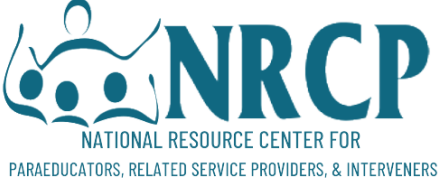The parameters for scopes of responsibilities for teachers and paraeducators as team members were developed by the National Resource Center for Paraprofessionals (NRCP) thru a grant of national significance funded by the Division of Personnel Preparation, Office of Personnel Preparation, Office of Special Education Programs (OSEP). Although OSEP funded the project, one of the primary goals was to identify the similarities in the responsibilities of teacher and paraeducator teams serving learners with diverse instructional and related services needs in early childhood settings, elementary, middle and secondary schools. The NRCP was assisted by a taskforce representing: SEAs. LEAs, professional organizations, two and four year IHEs, unions and parents. The proposed scopes of responsibilities developed by the taskforce and the standards for knowledge and skill competencies teachers and paraeducators required to carryout their responsibilities were validated and revised using a mail survey conducted among administrators in state and local education agencies, teachers, paraeducators, personnel developers in 2 and 4 year IHEs and other stakeholders The scopes of responsibilities for teachers are divided into six areas of responsibility. They along with standards for skill and knowledge competencies required by teachers to effectively lead instructional teams and supervise paraeducators are contained in: STRENGTHENING TEACHER/PROVIDER- PARAEDUCATOR TEAMS: GUIDELINES FOR PARAEDUCATOR ROLES, SUPERVISION AND PREPARATION (Pickett, 1999). The same publication contains scopes of responsibilities, knowledge and skill competencies, and performance indicators for paraeducators
RESPONSIBILITY 1: TEACHERS ARE LEADERS OF PROGRAM IMPLEMENTATION TEAMS WITH SUPERVISORY RESPONSIBILITY FOR PARAEDUCATORS.
The scope of responsibilities for teachers as supervisors of paraeducators includes:- Preparing assignments for paraeducators based on program needs, learning objectives for children and youth, and paraeducator skills.
- Involving paraedcators in various components of the learning process to support teacher administrative and program functions.
- Providing on-the-job training and feedback to paraeducators to prepare them to carry out team decisions,
- Monitoring the day-to-day performance of paraeducators,
- Sharing relevant information with principals about paraeducator strengths and professional development needs.
RESPONSIBILITY 2: AS TEAM LEADERS, TEACHERS CREATE AND MAINTAIN LEARNER-CENTERED SUPPORTIVE ENVIRONMENTS
The scope of responsibilities for teachers in providing supportive learner-centered environments includes:- Implementing, with the assistance of paraeducators, district policies and procedures for protecting the safety, health, and well-being of learners and staff.
- Involving paraeducators in learning activities that provide supportive and inclusive learning environments that respect differences among children, youth, their families, and staff.
RESPONSIBILITY 3: AS TEAM LEADERS, TEACHERS PLAN AND ORGANIZE LEARNING EXPERIENCES.
The scope of responsibility for teachers for planning and organizing learning experiences includes:- Planning lessons,
- Aligning curriculum content with and performance standards,
- Developing behavioral plans to achieve learning objectives and performance standards,
- Modifying learning pland and instructional strategies to accommodate difference in individual children and youth,
Involving paraeducators in planning and organizing learning experiences based on paraeducator qualifications to carryout the tasks.
RESPONSIBILITY 4: AS TEAM LEADERS TEACHERS ENGAGE CHILDREN AND YOUTH IN LEARNING EXPERIENCES
The scope of responsibility for teachers for ensuring that children and youth are actively engaged in learning experiences includes:- Providing, with the assistance of paraeducators, learning experiences that take place in different environments (classrooms, libraries, study halls, playgrounds, worksites and community based settings and center or home-based programs for infants and young children and their parents).
- Preparing paraeducators to use the methods, materials, and equipment required to carryout learning activities document learner performance.
RESPONSIBILITY 5: AS TEAM LEADERS, TEACHERS ASSESS LEARNER NEEDS, PROGRESS AND ACHIEVEMENTS.
The scope of responsibilities for teachers in the assessment process includes:- Administering and analyzing, with the assistance of other team members, results of standardized instruments for assessing learner achievement.
- Developing functional (informal) assessment tools to document learner performance.
- Analyzing the results of functional assessment activities.
- Keeping records documenting learner performance required by federal laws and state and district policies.
- Involving paraeducators in assessment and record-keeping activities for which they are prepared.
RESPONSIBILITY 6: AS TEAM LEADERS, TEACHERS PRACTICE STANDARDS OF PROFESSIOAL AND ETHICAL CONDUCT The scope of professional and ethical responsibilities for teachers connected with the supervision, evaluation and preparation of paraeducators includes:- Adhering to the ethical and professional standards of conduct related to the supervision of and evaluation of paraeducators established by the professional organization representing their discipline and/or the district or state.
- Modeling standards of professional and ethical conduct for paraeducators (i.e., maintaining confidentiality, demonstrating respect for the cultures and human and civil rights of learners and their families).
- Ensuring that paraeducators follow guidelines established by the district and/or state to protect the health, safety and well-being of learners and staff.
- Participating in opportunities for professional development that improve supervisory and team building skills.
